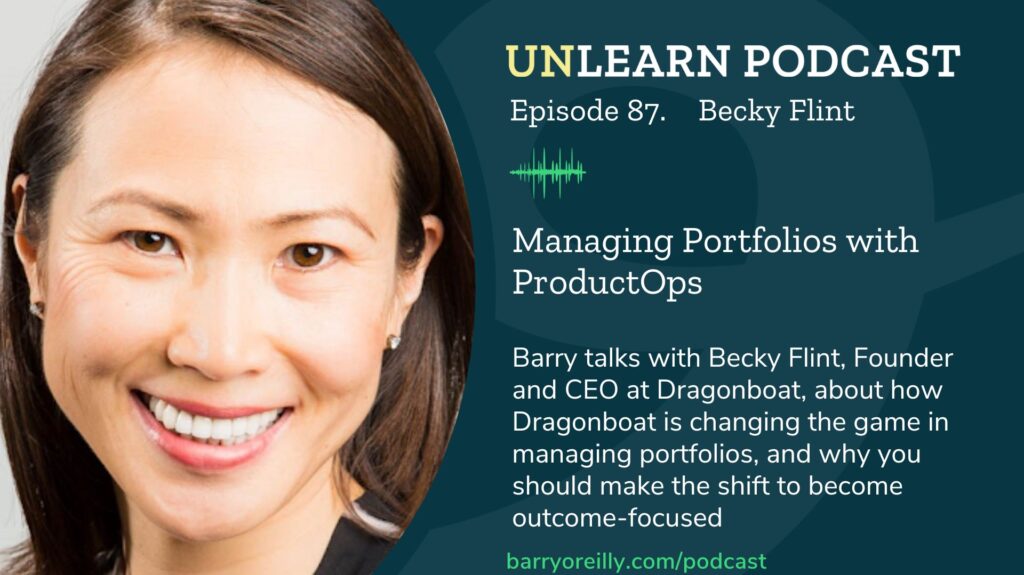Becky Flint is founder and CEO of Dragonboat, the responsive portfolio platform for product teams to build products customers love and deliver business results. In her career Becky has built and scaled portfolio management at Shutterfly, Feedzai and BigCommerce. She is an expert in managing ProductOps portfolios with an outcome-focused approach. In this episode of Unlearn, she and Barry O’Reilly discuss how Dragonboat is changing the game in portfolio management, and why you should make the shift to become outcome-focused. Listen to Managing Portfolios with ProductOps with Becky Flint.
Finding Her Way
Becky’s entrepreneurial journey wasn’t linear. She moved to the US with a medical background to study business, then went on to do tech, until she finally found her calling in product. She founded Dragonboat by piecing together the best bits of her experiences in these industries. One of the things that emboldened her to step out her comfort zone and go into completely different domains was her confidence in her ability to learn new things. Becky believed she could build on top of the skills she already had and learn what she didn’t know. It was better than starting from zero, with no skills, knowledge or experience to speak of, she shares. [Listen from 1:45]
Becky discusses some misconceptions she had about portfolio management. “From job to job, you have to unlearn a lot of stuff. Your success in your previous company does not guarantee your success in this role,” she says. Now that she was working for herself, she had to hold herself accountable, and measure success in the short term and midterm very differently. She didn’t have a team to bounce ideas with, or a lot of resources available to her as she did in her previous companies. “I [took] the ingredients in spirit from previous roles and brought them into this new environment,” Becky adds. “The essence of success was still there, just in a different form.” [Listen from 9:50]

Building Dragonboat
The development of the portfolio management at PayPal was originally a connect-the-dots for certain systems, according to Becky. Data revealed business outcomes, product strategy and execution, and resourcing weren’t properly communicating, so Becky created a middle engine to put all the messy stuff together. Barry remarks, “Even a few hours ago, I was in a session with some teams… and you could see that people were struggling because sometimes their corporate strategy just feels so far removed from their day-to-day work.” Becky’s “phenomenal” portfolio management makes a typically difficult process significantly easier. [Listen from 14:15]
Becky tells Barry, “Strategies need to be laid on top of each other to see how they contribute to overall goals and what kind of resources you need. If you have a strategy, you have a way to do it, [but] without resources it doesn’t mean anything. These two conversations need to happen together.” [Listen from 19:45]
(Listen to Building Developer Platforms & Working with Mentors with Kaspar von Grünberg)
Outcomes Over Outputs
One of the biggest debates in the product management industry currently is the notion of becoming more outcome-focused, Barry comments. However, not only is it difficult, but it’s also a huge change in the way people manage their work. Most people are primarily focused on output-based measures of success, such as being on time and being on budget. Becky describes some of the growing pains she experienced in helping people shift their mindsets. “Output focus really came from the industry era… the executive would make all the calls and the team would just do what they were told, but then we realized the executive doesn’t know everything, they don’t have the latest information, so they have to rely on the team to stay competitive,” she explains. “If you have to rely on the team, how do you know your team is doing a good job? How do you make them successful? You have to give them the ability to measure their success.” [Listen from 26:10]
Making the Decision to Make a Decision
Every time you make a decision, you must consider the upside, the limiting factor of time, and the resources you have available. “Not making a decision means you already failed,” Becky advises. “You definitely don’t have resources for all of them. If you want to do all of them and you don’t have the resources, everything will take forever and you won’t get any outcomes.” [Listen from 33:15]
Product management is essential in becoming outcome-focused, but it’s only part of the picture. Think in a way that’s “portfolio, not just product,” Becky adds. You should always have a portfolio – a story of where you want to go, all your challenging and conflicting goals, and competing opportunities and strategies. [Listen from 35:30]
(Listen to The Power of Leading by Example with Cecelia Myers)
Looking Ahead
“What I’m most excited to see really is the trend moving from the output-focused command and control to the outcome-focused empowerment,” Becky notes. “I really believe you need alignment to be able to empower your team. Alignment and autonomy need to come together, so not too much control or the chaos of no control.” [Listen from 42:30]















